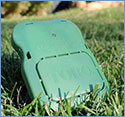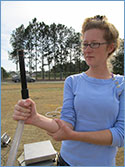IrriGATOR Newsletter — Spring 2013
 A Note from Dr. Michael Dukes
A Note from Dr. Michael Dukes
Welcome to the Spring 2013 IrriGATOR newsletter. Just as the changes in weather from winter to spring begin to take effect, our research activities are shifting from frost protection of strawberries to maximizing water conservation during the spring green-up period that historically has little rainfall. Please take a moment to catch up on my team of researchers and our activities.
Happy reading, Michael D. Dukes
Feature Story: Soil Moisture Sensors Save Water
We began research involving smart technologies in 2004 using soil moisture sensor systems (SMSs). The SMSs were add-on devices that connected to the existing irrigation timer. The system includes a sensor buried in the soil and a sensor controller wired to the timer to act as a disruption switch when the soil moisture exceeds a threshold. When disruption occurs, the soil is considered too wet for additional water and the entire irrigation cycle is bypassed. Since 2004, UF-IFAS has expanded SMS research to include multiple plot studies and residential cooperator studies. Though each study was designed to address specific research questions, the global objective was to determine if SMSs could reduce irrigation application compared to typical residential irrigation systems without sensor feedback (WOS). Read the full story
More on Soil Moisture Sensors…
Does it Pay?
Research results across projects were consistent and clearly demonstrate that SMSs in Florida—when properly installed, set, and maintained—could lead to important irrigation water savings while maintaining acceptable turfgrass quality. The prices of SMSs have continued to drop from $500+ per unit in 2004 to <$200 by 2011. Considering the high price of the potable water in some localities and the potential water savings when using a SMS, the payback period for these units at an average single-family home could be around 2 years or less.
 So What's Next?
So What's Next?
Due to the increased use of reclaimed water for residential irrigation in Florida, there is the potential for declining SMS functionality from poor soil water conductivity or sensor degradation due to the increased salts in the water. Our current research focuses on testing SMSs at both field plots and homes that use reclaimed water as their source for irrigation. Look for a summary of those results in a future issue of the IrriGATOR.
We would like to thank the following agencies for funding these research studies:
Southwest Florida Water Management District
Pinellas County Utilities
Tampa Bay Water
Florida Turfgrass Association
Golf Course Superintendents Association of America
Florida Department of Agriculture and Consumer Services
Florida Agricultural Experiment Station
What's Up with the Research Team?
 Meet Sarah
Meet Sarah
Sara Wynn joined the IrriGATOR research team in October 2011 as an undergraduate research assistant. While still in school, Sara worked mostly on the strawberry frost protection project, assisting with field work and data analysis. After graduating with a dual Environmental Management in Agriculture and Natural Resources/Chinese Language degree, she continued working with the research team on a variety of projects. Most recently, she has been assisting with distribution uniformity (DU) tests for a sprinkler nozzle performance project.
Sara hopes to be accepted to National Taiwan University in Taipei, Taiwan for the fall 2013 semester to begin a master’s program in Agricultural Economics. In the future, she would like to work in agricultural development in Asia. Wherever she ends up, Sara will always remember the start she got at UF and with the IrriGATOR team!
Updates to the Website
If this is your first visit to our website in a while, then we encourage you to check it out. We’ve added short, introductory videos for each research team member that can be found near our contact information.

